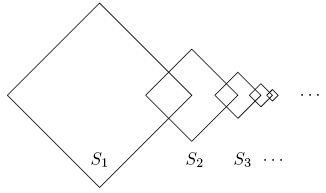Difference between revisions of "1995 AIME Problems"
m |
m |
||
| Line 35: | Line 35: | ||
Given that <math>\displaystyle (1+\sin t)(1+\cos t)=5/4</math> and | Given that <math>\displaystyle (1+\sin t)(1+\cos t)=5/4</math> and | ||
<center><math>(1-\sin t)(1-\cos t)=\frac mn-\sqrt{k},</math></center> | <center><math>(1-\sin t)(1-\cos t)=\frac mn-\sqrt{k},</math></center> | ||
| − | where <math>\displaystyle k, m,</math> and <math> | + | where <math>\displaystyle k, m,</math> and <math>\displaystyle n_{}</math> are positive integers with <math>\displaystyle m_{}</math> and <math>\displaystyle n_{}</math> relatively prime, find <math>\displaystyle k+m+n.</math> |
[[1995 AIME Problems/Problem 7|Solution]] | [[1995 AIME Problems/Problem 7|Solution]] | ||
Revision as of 01:15, 22 January 2007
Contents
[hide]Problem 1
Square ![]() is
is ![]() For
For ![]() the lengths of the sides of square
the lengths of the sides of square ![]() are half the lengths of the sides of square
are half the lengths of the sides of square ![]() two adjacent sides of square
two adjacent sides of square ![]() are perpendicular bisectors of two adjacent sides of square
are perpendicular bisectors of two adjacent sides of square ![]() and the other two sides of square
and the other two sides of square ![]() are the perpendicular bisectors of two adjacent sides of square
are the perpendicular bisectors of two adjacent sides of square ![]() The total area enclosed by at least one of
The total area enclosed by at least one of ![]() can be written in the form
can be written in the form ![]() where
where ![]() and
and ![]() are relatively prime positive integers. Find
are relatively prime positive integers. Find ![]()
Problem 2
Find the last three digits of the product of the positive roots of
![]()
Problem 3
Starting at ![]() an object moves in the coordinate plane via a sequence of steps, each of length one. Each step is left, right, up, or down, all four equally likely. Let
an object moves in the coordinate plane via a sequence of steps, each of length one. Each step is left, right, up, or down, all four equally likely. Let ![]() be the probability that the object reaches
be the probability that the object reaches ![]() in six or fewer steps. Given that
in six or fewer steps. Given that ![]() can be written in the form
can be written in the form ![]() where
where ![]() and
and ![]() are relatively prime positive integers, find
are relatively prime positive integers, find ![]()
Problem 4
Circles of radius ![]() and
and ![]() are externally tangent to each other and are internally tangent to a circle of radius
are externally tangent to each other and are internally tangent to a circle of radius ![]() . The circle of radius
. The circle of radius ![]() has a chord that is a common external tangent of the other two circles. Find the square of the length of this chord.
has a chord that is a common external tangent of the other two circles. Find the square of the length of this chord.
Problem 5
For certain real values of ![]() and
and ![]() the equation
the equation ![]() has four non-real roots. The product of two of these roots is
has four non-real roots. The product of two of these roots is ![]() and the sum of the other two roots is
and the sum of the other two roots is ![]() where
where ![]() Find
Find ![]()
Problem 6
Let ![]() How many positive integer divisors of
How many positive integer divisors of ![]() are less than
are less than ![]() but do not divide
but do not divide ![]() ?
?
Problem 7
Given that ![]() and
and
where ![]() and
and ![]() are positive integers with
are positive integers with ![]() and
and ![]() relatively prime, find
relatively prime, find ![]()










